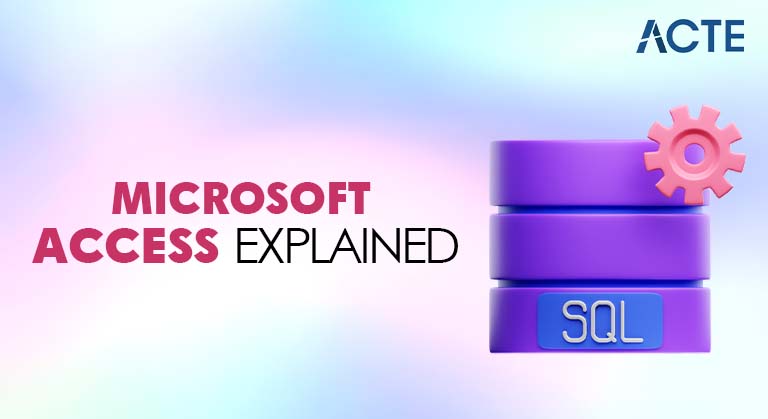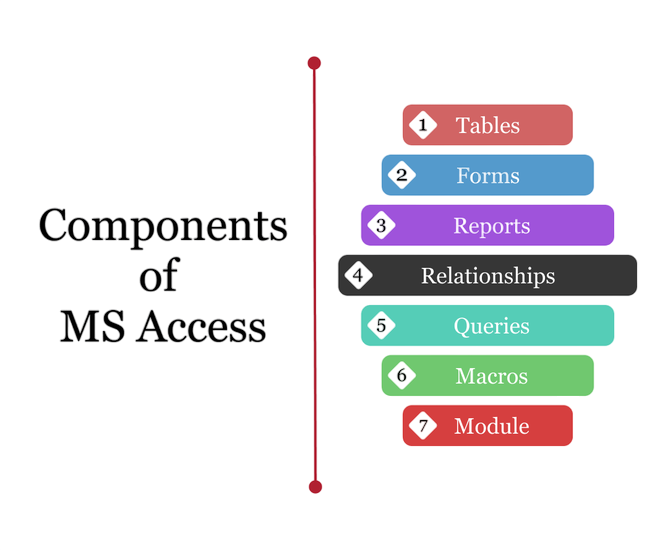
- What is Microsoft Access used for?
- Components of Microsoft Access
- Uses of MS Access
- Benefits of Microsoft Access
- Versions of MS Access
- What is Replacing Microsoft Access?
- Importing and Exporting Data
- Conclusion
What is Microsoft Access used for?
Microsoft Access is a relational database management system (RDBMS) developed by Microsoft that allows users to store, manage, and analyze structured data. It is widely used by individuals, small businesses, and departments within larger organizations to create custom database solutions without requiring advanced programming skills. With its intuitive graphical interface, users can design tables, create forms for data entry, build queries to retrieve specific information, and generate reports for analysis and decision-making. One of the key uses of Microsoft Access is building small to medium-sized Database Training applications, such as inventory management systems, customer relationship management (CRM) tools, employee records, and sales tracking systems. It is particularly useful when multiple users need to input or access data simultaneously in a shared environment. Access supports automation through macros and VBA (Visual Basic for Applications), enabling users to add functionality like buttons, validations, or custom workflows. It also integrates seamlessly with other Microsoft Office tools like Excel, Word, and Outlook, and allows importing and exporting data to various formats including SQL Server and SharePoint. Overall, Microsoft Access is a powerful and accessible tool for developing and managing relational databases, especially when ease of use, quick deployment, and integration with the Microsoft ecosystem are priorities.
Do You Want to Learn More About Database? Get Info From Our Database Online Training Today!
Components of Microsoft Access
- Tables- In the Microsoft Access database, tables act because of structure. Similar to the spreadsheet, they maintain information in rows and columns. Users can create new tables, import facts from different sources, or use one of the pre-constructed templates.
- Forms- For user- pleasant information enter and viewing, bureaucracy may be useful. Users can create their custom bureaucracy or use pre-constructed layouts from the Access library. Forms may be related to Database in PostgreSQl tables to hurry up information access and editing.
- Queries- Searching for unique information in the database has finished the use of queries. Users can use pre-constructed searches to shop time or expand bespoke queries to retrieve information that fits precise criteria.
- Reports- To offer facts credibly and attractively. Users can construct their custom reviews or use pre-made reviews from the Access library to show information in a manner that makes experience to them.
- Macros- To automate tactics in Microsoft Access, macros are useful. The introduction of macros via way of means of customers permits them to carry out several operations simultaneously, which includes jogging a query, converting a table, and producing a report.

Uses of MS Access
Microsoft Access is a not unusual desire for companies, organizations, and those who want to save and examine statistics efficiently due to its user-pleasant layout and effective features.
These are among the maximum not unusual programs of Microsoft Access:
- Data control- Microsoft Access is regularly beneficial for coping with and organizing statistics. Users can construct tables, connections among tables, and queries to locate and kind statistics. Because of this, it’s far a broadly used device for coping with consumer statistics, inventories, and different sorts of information.
- Application development- Microsoft Access can create specific programs like order access structures or task control equipment. It`s easy for builders to assemble specific apps with out writing an awful lot code due to their integrated paperwork, tables, and different components.
- Project control- Managing and monitoring tasks is viable with Microsoft Access. Users can assemble tables to prepare task information, such as tasks, due dates, and resources. As properly as the usage of reviews, Difference Between SQL and Python they could broaden paperwork for coming into and enhancing task statistics.
- CRM (Customer Relationship Management)- Microsoft Access can hold song of consumer statistics which include touch information, buy history, and preferences. Users can layout paperwork for coming into and enhancing consumer statistics and make use of reviews and queries to observe consumer conduct and preferences.
Benefits of Microsoft Access
Microsoft Access offers several benefits that make it a popular choice for individuals and small to medium-sized businesses managing structured data. One of its key advantages is its user-friendly interface, which allows users to create and manage databases without needing deep technical or programming knowledge. With built-in templates and drag-and-drop features, users can quickly build forms, tables, queries, and reports to meet specific business needs.
Another major benefit is rapid development. Access enables users to create functional database applications in a relatively short time, making it ideal for projects with tight deadlines or limited resources Graph databases. It also supports VBA (Visual Basic for Applications) and macros, allowing for customized automation and enhanced functionality without complex coding.

To Earn Your Database Certification, Gain Insights From Leading Blockchain Experts And Advance Your Career With ACTE’s Database Online Training Today!
Versions of MS Access
Microsoft Access has evolved significantly since its initial release, with each version introducing new features and enhancements to improve functionality, performance, and integration. The first version, Access 1.0, was released in 1992 as part of the Microsoft Office suite. Over the years, newer versions such as Access 97, Access 2000, and Access 2003 introduced improvements in user interface, data handling, and support for larger databases. With Access 2007, Microsoft introduced the Ribbon interface and a new file format (.accdb), replacing the older .mdb format. This version also added support for multivalue fields and improved integration with SharePoint. Access 2010 expanded on this by including enhanced macro capabilities and better web database support. Access 2013 and Access 2016 continued the trend, improving performance and offering better integration with cloud services and Office 365. Access 2019 included modern charts and enhanced support for larger data types, Object-Oriented Databases making data analysis more effective. The latest version, Microsoft Access in Microsoft 365, receives regular updates and improvements as part of the subscription model. It offers improved security, cloud integration, and collaboration features, ensuring users always have access to the most current tools for building and managing databases.
What is Replacing Microsoft Access?
Replacing Microsoft Access options are gaining reputation because of their exclusive capabilities and benefits, making them a super desire for groups and those seeking out a Microsoft Access replacement. The following are a number of the maximum famous Microsoft Access options:
- Power Bi: Power BI, a cloud-primarily based totally commercial enterprise intelligence platform, allows customers to create interactive dashboards and reviews at the same time as additionally offering a integrated database engine for facts garage and control.
- Google Sheets: Google Sheets, a net-primarily based totally spreadsheet software similar to Microsoft Excel, permits customers to create and manipulate databases at the same time as imparting quite a number collaborative capabilities that beautify their suitability for teamwork.
- Airtable: Airtable the consumer-pleasant cloud-primarily based totally database generation that has purposefully advanced for simple use. Its a drag-and-drop interface streamlines advent and control of Database Training.
- Zoho Sheet: Zoho Sheet, that’s a part of Zoho Office Suite, is effective and consumer-pleasant cloud-primarily based totally a spreadsheet software. This bendy device may be used for diverse tasks, which includes facts entry, evaluation, and the technology of charts and graphs. Furthermore, Zoho Sheet connects easily with different Zoho applications, taking into consideration clean facts sharing and joint efforts.
Importing and Exporting Data
Importing Data in Microsoft Access
- Import data from various sources such as Excel, CSV, Text files, SQL Server, and SharePoint.
- Supports linking to external data sources for real-time access without duplication.
- Allows mapping of source fields to Access table fields during import.
- Data types and formatting can be adjusted during the import process.
- Useful for consolidating data from multiple platforms into a single database.
- Export tables, queries, or reports to formats like Excel, PDF, Text, XML, and CSV.
- Enables data sharing and reporting across other applications Nosql Databases Explained or systems.
- Supports exporting data for use in other database systems or for backup purposes.
- Export options allow customization such as selecting specific fields or applying filters.
- Automation of exports is possible using macros or VBA.
Exporting Data in Microsoft Access
Preparing for a Database Job? Have a Look at Our Blog on Database Interview Questions and Answers To Ace Your Interview!
Conclusion
Microsoft Access is a sturdy device that may assist corporations and those correctly control large volumes of facts. It is an adaptable technique that may simplify your facts, control responsibilities and simplify your processes. Due to its bendy reporting and Database Training functions, you may effortlessly customize it to fulfill your needs. Access makes coping with purchaser facts, coping with inventories, and appearing facts evaluation simple. While Access and Excel can also additionally percentage positive similarities, get admission to give superior functions and capability designed mainly for coping with large and complex databases.


